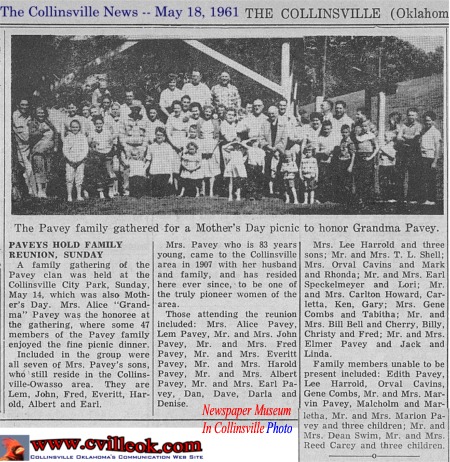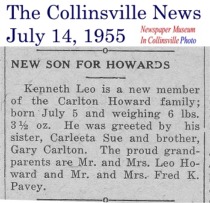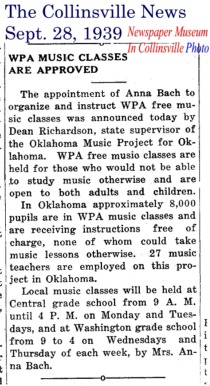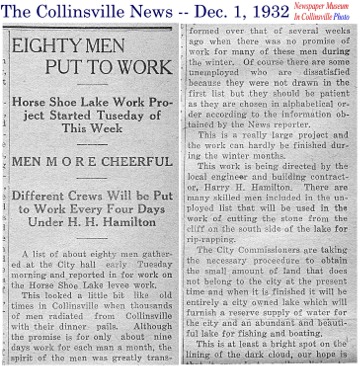|
This
page sponsored in part by: |
|
Collinsville,
Oklahoma
November 18, 2007 Florence Howard's Depression Interview |
| Tara
B. Howard ELED 4343 Oral History Assignment December 2, 2004 GREAT DEPRESSION INTERVIEW The following interview regarding the Great Depression of 1929 was conducted with my husband’s grandmother, Florence Alice Marie Pavey Howard. Born August 10, 1925, she was young when the Depression started, however, remembers the impact it had on her life as a young child. When was the first time you remember recognizing what the Great Depression meant? I was only four years old when it started. I know we were extremely poor but we were just happy to have our family. How did your family manage in those times? My mother stayed at home with us kids. She tended to the garden and canned fruits and vegetables. She was a good manager. My father worked whenever work was available. He worked in the coal pits and other various positions. Where did you live and how did your family come to live there? I was born and raised in Collinsville, Oklahoma. My mother moved here from Kansas. She came in a covered wagon. How many were in your family? There was five of us: my mother, father, two sisters, and me. Were other people besides immediate family living with you? Normally, no. However, one time our family went to live with a friend of my father’s who had just divorced so my mother could help with his children. What one image do you picture when you think of the Depression? I remember the farmers in Collinsville could not feed their cattle because it was really dry and their was not enough food. The government came and shot the cattle but did not let anyone use the beef to eat. I never understood that and it has always bothered me. I remember not having any shoes. My mother found a pair of high-top shoes that were worn out and she put cardboard inside of them and wired the heels. We thought the school was going to buy us shoes. My uncle bought me a pair of black, patent leather mary janes to wear. After that, the school loaded us on a bus, took us to Tulsa, and bought everyone a pair of shoes. I was too young to have sense enough to say that I didn’t need a pair. My uncle always gave me a hard time about that. Describe your apartment or house. Our house had three rooms, not much furniture, a wood stove. My uncle gave us one cow for my mother to milk. Later, I remember moving to a much larger house that had a basement, two bedrooms, a kitchen, and gas to cook with. I don’t remember if we had electric lights or not. What kind of meals do you remember? We had lots of rice and beans. We also had food from our garden. We had a blackberry bush that we picked blackberries from. My mom canned them and made jam. I specifically remember my mother telling me about a day that there was absolutely nothing in the house for her to feed us. We wanted to go play with the neighbors but she told us not to ask for anything to eat unless they offered first. They offered and we ate. Was your clothing store-bought? Homemade? Hand-me-downs? This is a story that I have been wanting to tell you about: A long time ago, you didn’t just buy 5 pounds of flour like you do now. My mom bought 25-30 pounds of flour at time. Back then, the flour sacks were made of cotton material. My mother made our panties, pajamas, slips, and tea towels out of those flour sacks. Later on they started making the material in a print, so she would make us dresses from the sacks. My mother was a great seamstress, she didn’t even need a pattern. She would make us dresses from old coats. I don’t remember wearing hand-me-downs because I was the oldest, but I’m sure my sisters did. How many shoes did children typically get in a year? If we were lucky, we got one. We didn’t wear shoes in the summer, we went barefoot. Describe what it was like at the school you attended during the Depression. The WPA (Works Progress Administration) built our schoolhouse. Mrs. Blevins was my first grade teacher. She was a love. She taught for many years. We did have to buy our own books. What kind of transportation did your family have? Our feet. We walked everywhere we went. What sort of activities did you do for fun/recreation? I remember making a playhouse in the basement. We had dishes. We also played tag with other kids. What were the prices of a candy bar? A loaf of bread? A car? A house? Candy bars, bread, and hamburgers were all about a nickel a piece. We used to get “snappy packs” which was a cardboard box with vanilla ice cream at one end and orange sorbet at the other. They were absolutely delicious! They were a nickel. We never owned a house, we always rented. My mother had the chance to buy a five room house for $400 and pay it out ten dollars each month. She wouldn’t do it, I don’t know why. Do you remember songs from the Depression years? My uncle used to sing “Bye Bye Blackbird”. I also remember, “Little Brown Jug”, and “Frankie and Johnny” Do you remember a movie from that time? On Saturday nights we watched, “Hop Along Cassidy” because that’s what my dad liked. Do you have any recollections about how your parents felt about President Roosevelt? My parents were happy about the WPA because it helps young men get jobs. I had a cousin who got a really good job through the WPA. Do you remember any disaster, besides the Depression that happened in your town/area during this era? I don’t remember any disasters. However, we did have something good happen in our town. We had really good clay in the Collinsville area and the brick yard came to town. It provided lots of jobs for our residents. Our streets were (and some still are) paved with brick. Main Street had a white way down the middle of the street with three pronged lights. It was beautiful. We were all upset when they were taken down. What type of impact did the Great Depression have on your life? The way you live your life, save or spend money? I am very frugal and try to not take anything for granted. Overall, how bad do you think the Great Depression hurt our nation? I know that lots of people left Oklahoma to find jobs in California. Our nation’s economy and job market was really devastated. 2004 Note: Florence Howard, “Grandma”, is 79 years old and still makes her home in Collinville. |
|
This
web site is brought to you by the Newspaper
Museum In Collinsville and the other advertisers appearing on these
pages. If you would like to provide news content or advertisements ...
call Ted Wright (918) 371-1901 or
send email to wrightted@aol.com. 1110 W. Main, Collinsville, OK 74021 |
|
Home
(email questions/comments to wrightted@aol.com). Ted Wright -- last update 11/18/2007 (FlorenceHowardInterview.html) www.cvilleok.com Copyright 2007 -- Collinsville, Oklahoma |
|
|
|
This
page sponsored in part by: |
| Florence Alice
Howard (August 10, 1925 - October 31, 2007) |
|
Florence Alice Howard,
82, of Collinsville, OK passed away Wednesday, October 31, 2007 in Collinsville,
OK. She was born August 10, 1925 in Collinsville to Fred and Lucille
(Lawrence) Pavey. She graduated from Collinsville High School. She later
married Carlton Howard on June 1st, 1943. She was a lifelong resident
of Collinsville, OK. Funeral services were held Friday, November 2, 2007 at the First Baptist Church of Collinsville with Brother Paul Simpson officiating. Pallbearers will be: Clint Cash, Clay Cash, Fred Bell, Bill Bell, Doug Pavey and Wendell Harold. Interment followed at the Ridgelawn Cemetery under the direction of Collinsville Funeral Home. |
| Mrs. Howard was visiting her husband (in 1944) who was in the Navy and later in 1945 sailed into Tokyo Bay (Japan) aboard the cruiser USS Detroit. |
 |
| Mr. and Mrs. Carlton Howard and kids were part of this 1961 Pavey family reunion in Collinsville City Park. |
 |
| Ken Howard's 1955 birth notice. |
| All three Collinsville Banks had failed in the late 1920s. Citizens either lost all of their deposits or occasionally received pennies on the dollar years later. The American Exchange Bank was formed in 1928 in that void and helped provide many years of financial stability. (Previous Coverage) Note that hard times started in Collinsville well before the national 1929 depression, I assume at least in part due to the loss of the zinc smelters in the early 1920s. -- Ted |
 |
 |
| Government work programs created jobs and music classes that would not have been available otherwise after the depression. |
 |
| Collinsville's City Lake was built as a WPA program. |
